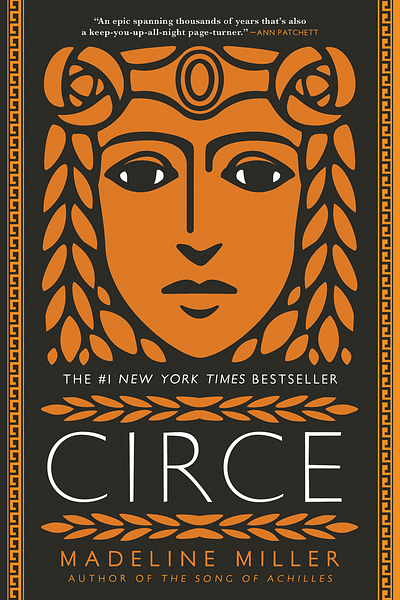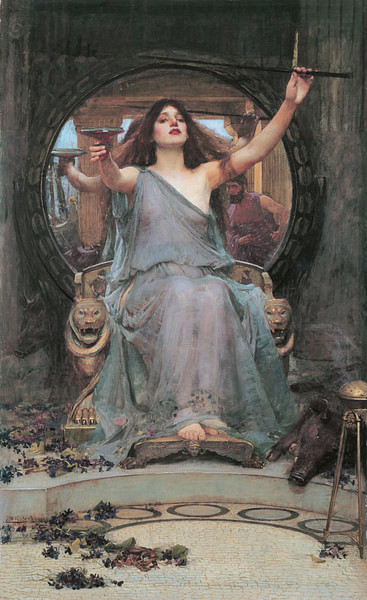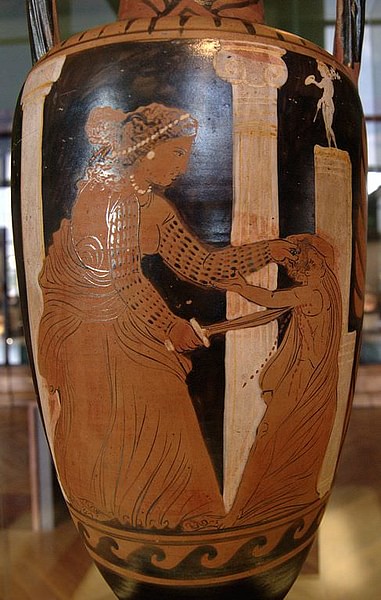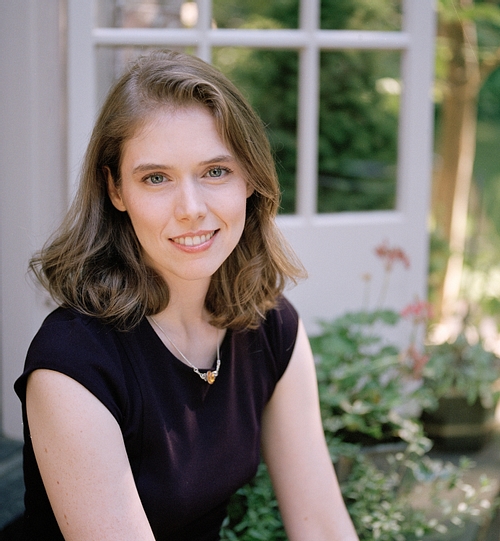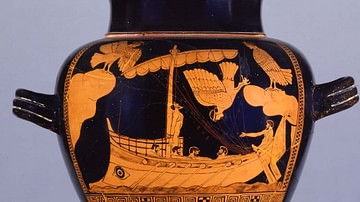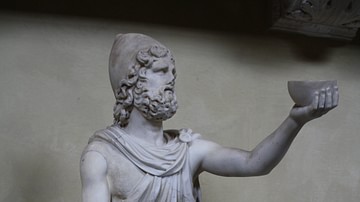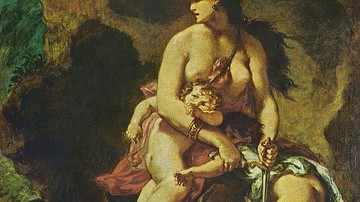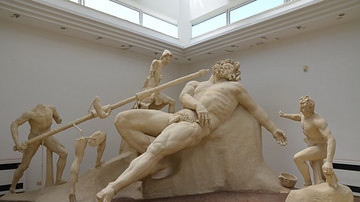Award-winning writer Madeline Miller's newest novel, Circe, tells the story of a sorceress who was once the onetime lover of the wily Odysseus. The heart of the novel is, nonetheless, that of a woman's yearning for self-discovery, purpose, and ultimately, empowerment. In this exclusive interview, Madeline Miller once again speaks to James Blake Wiener of Ancient History Encyclopedia (AHE).
JBW: Madeline Miller, your interview with me on The Song of Achilles was one of my first for Ancient History Encyclopedia (AHE) and so I am delighted to be interviewing you once more. Congratulations on the publication of your latest novel, Circe, and thank you for speaking with me!
I am curious to know how the writing process for Circe differed from that of The Song of Achilles. Did you encounter any specific challenges with regard to tone or background research when completing Circe?
MM: Thank you so much for having me back, James!
For me, Circe and The Song of Achilles were very different. With The Song of Achilles, I felt I was bringing to light a story that was hidden in the material already. With Circe, I was pushing back against the material, stripping out Odysseus' voice, and giving Circe the chance to speak instead.
The biggest challenge with Circe was imagining how a god thinks. Circe is an immortal being who sees centuries and millennia pass by. I wanted that to be reflected in the way she spoke and the way she experienced time. I also had many more characters to juggle with Circe, since her family is huge. I wanted to give each relative their own life, but I did not want the reader to be overwhelmed, so that took a lot of thought and balancing.
JBW: What was it that first attracted you to Circe, and what is it that held your fascination as you authored her story? Circe is arguably the first witch to appear in western literature, and I suspect she might have cast her spell on you by virtue of that fact alone.
MM: In the Odyssey, Circe is very clearly the incarnation of male anxiety about female power—the fear is that if women have power, men are getting turned into pigs. The word 'witch' is still used today as a slur against women with an amount of power that makes society nervous. I am always interested in people that others are actively trying to keep quiet!
I was drawn to Circe in particular because of her mysteries and her complexities. Circe is born a nymph, the lowest of the low in divine terms. In ancient mythology, nymphs were pawns or prey: married off, assaulted, raped. They had little agency over their own lives. Yet when we see Circe in the Odyssey, she is immensely powerful, capable of great destruction, and also great benevolence. She has done an end-around, and literally invented her own power—witchcraft. I wanted to discover how she came to the power, and what it was like for her to wield it in a world that is so hostile to her independence.
And of course, there is the big question which Homer does not answer: why is she turning men to pigs? Oftentimes that has been answered in this sort of shrugging way — 'well, you know women'. Aside from being sexist, that is also a truly boring answer. People do things for reasons, and I wanted to understand how she would come to something so extreme.
JBW: Circe is a very human story about a clever woman attempting to discover her strengths and roles within the wider world. Additionally, she has to contend with a rather trying family.
Circe has fluctuating relationships with her father Helios, her mother Perse, and her siblings Pasiphaee, Aeetes, and Perses of Colchis. How would you describe her family dynamic, and what would you say about her relationship with Helios in particular?
MM: One of the things that I love about Homer is how real and relevant his stories feel. Yes, there are six-headed monsters and gods but, at its heart, the Odyssey is the story of an exhausted war veteran desperate to get home to his family and struggling to re-enter his life. Circe goes on a similar odyssey—she is born into a horrendous, abusive family and must find a way to leave them and make a new home for herself.
The Greek gods were largely despicable; self-absorbed, petty, angry, narcissistic. I wanted to imagine what a family like that would be like, how alienating and frightening that would feel. Helios is a terrifying father, and part of Circe's journey is figuring out how to separate from him and defend herself from his rage.
JBW: Zeus ultimately banishes Circe to the deserted island of Aiaia. There, she meets some of the 'all-stars' of ancient Greek mythology, including the Minotaur, Daedalus and his son Icarus, and, of course, Odysseus.
What compelled you to narrate Circe's interactions with these various mythological figures? Did you have a favorite among these figures that you explored in writing vis-à-vis Circe?
MM: Circe is startlingly rich in relatives. In ancient literature, she is the aunt of the Minotaur and Medea, and also a cousin to Prometheus. So I knew that those were three myths I wanted to explore from the beginning.
I enjoyed all of the secondary characters that came with that, but the master inventor Daedalus was a particular favorite, mostly because he surprised me. I expected him to be a minor character, but as I wrote, he kept growing, and his and Circe's interactions became ever more significant. In him, she finds a fellow craftsman, someone who loves to work and create as she does.
I enjoyed the chance to explore Odysseus again, this time as an older and wearier man. Today he is a beloved and celebrated figure, but the ancients were much more ambivalent about him. I wanted to acknowledge his full capacity for violence, error, and pride, as well as his bravery and intelligence.
Most of all, I loved digging into the women of the story: Circe's sister Pasiphae, Ariadne, Penelope, Medea, and more. I wanted them to have the same flesh and vitality that the male heroes have had for millennia.
JBW: Circe meets her niece Medea in your novel, and she sees many aspects of her own personality reflected within Medea.
In what ways are the two women similar in your opinion? In what ways are they different?
MM: They are both intelligent, determined women who endured trauma and terror as children. Homer describes Aeetes, Circe's brother and Medea's father, as having a mind "bent on destruction." I wanted to imagine what it would be like to grow up with that.
But they are also quite different. Circe's pain has made her more empathetic to the suffering of others. Medea has learned that she has to look out for herself because no one else will. Both are very real reactions to the type of abuse they experience. Medea is also much, much younger than Circe is, and it was her youth and inexperience that moved me most of all.
JBW: Circe is also rather interested in Penelope, right? She learns quite a bit about Penelope from Odysseus.
MM: Penelope was one of the pillars of the novel for me, and I think it is natural that Circe would be drawn to her. Not just because of her relationship with Odysseus but because of the way he speaks of her: as an artist, a brilliant mind, a keen observer of human nature. But I also wanted to honor the parts of her that do not get noticed as much: her single parenting of Telemachus, her strong will and self-discipline, the fact that she is a survivor. In this sense, she and Circe have a lot in common.
JBW: I noticed the numerous references to crafts in Circe, including weaving, carpentry, and metalworking. Many of those passages were especially interesting.
What would you say is Circe's real craft aside from sorcery? The ability to adapt and persevere, perhaps?
MM: Yes. Transformation is Circe's greatest gift. Most gods are stagnant by nature; they never have to try, so they never fail, and therefore never learn, grow or change. Circe does all those things, supported by her tremendous will. She is also an artist, and art itself is transformative. An artist forges raw materials into beauty and meaning. That meaning then has the ability to change all those who experience it.
JBW: Following the success of The Song of Achilles and now Circe, I am eager to know who else has captured your attention.
Can AHE's readers expect another novel pertaining to the ancient world at some point in the near future? I still keep hoping you will write about Dido or Persephone.
MM: Both Dido and Persephone would make excellent subjects; they are such rich stories, with so much to explore. I confess that I do have my eye on Vergil's Aeneid. But right now the story that is most possessing me is Shakespeare's Tempest. I am also a Shakespeare theater director, and the Tempest has been rattling around in my mind for many years now. And there is still a bit of Classics in there—Vergil and Ovid are all over the Tempest.
JBW: Thanks so much, Madeline! I enjoyed reading Circe, and I know that many of our readers will as well. I look forward to reading your next novel in due time too.
MM: Thanks, James!
Madeline Miller was born in Boston and grew up in New York City and Philadelphia. She attended Brown University, where she earned her BA and MA in Classics. For the last ten years, she has been teaching and tutoring Latin, Greek, and Shakespeare to high school students. She also studied in the Dramaturgy department at Yale School of Drama, where she focused on the adaptation of classical texts to modern forms. She currently lives near Philadelphia, PA. The Song of Achilles was her first novel. Her second novel, Circe, was published in 2018 CE. Visit her website to learn more: www.madelinemiller.com

